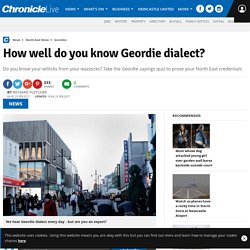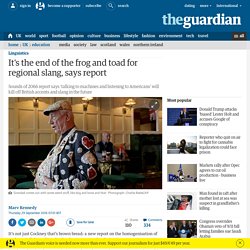

‘Ya cheekeh monkeh’: recording Manchester accent diversity. Are northern English accents dying out? Are they eck as like. Ah, the stalwarts of summer!

Cowes, Goodwood, the Proms and, these days, gloomy academic prognostications about the future of northern accents. Last summer, Manchester University claimed that the speech differences of the big northern cities were fading, merging into a generalised uber-northern that, implausibly, might include Alan Bennett, Ant and Dec and Atomic Kitten. East End Cockney accent 'fading' A new form of accent is replacing the traditional Cockney in some parts of the East End, research has found.

White youths are among those speaking in a dialect combining Bangladeshi and Cockney influences - reflecting population changes in the area. Research for the BBC Voices project found white youngsters had adopted words from Bangladeshi friends such as "nang" (good) and "creps" (trainers). Similar accent changes were also found in areas of Cardiff and Liverpool. Local identity A nine-month study of youngsters took place at a youth club in the borough of Tower Hamlets, East London as part of the BBC project into accents and dialects across the UK. Michael Gove's grammar: former education minister is gonna rue the day he used Nonstandard English. Tensions are running high.

The battle for Brexit is reaching its climax. The need for government ministers to sound decisive and determined is tantamount. So why does government minister Michael Gove suddenly sound like he’s speaking in someone else’s voice? In a recent interview with BBC Politics Live, the host Andrew Neil asked Michael Gove what the government would do if Labour succeeded in getting a referendum amendment attached to the deal. Gove’s answer was short and blunt: “That ain’t gonna happen … There ain’t gonna be no second referendum.” Gove’s answer used two grammatical constructions of Nonstandard English (any structured variety of English which differs from Standard English): “ain’t” (instead of Standard English “isn’t”) and a construction referred to as a double negative (or as an instance of multiple negation, or negative concord). Why does the UK have so many accents?
Where we come from matters.

Our origins form an important part of a distinctive personality, which can become a group identity when we share these origins. More often than not, our use of language, especially our dialect, is an expression of that distinctiveness. In addition to distinctive words and grammatical patterns, which may not follow the rules of Standard English, people have accents – many English language ones available to listen to here – related to their pronunciation when they speak which can articulate their identity.
Dialects and accents developed historically when groups of language users lived in relative isolation, without regular contact with other people using the same language. This was more pronounced in the past due to the lack of fast transport and mass media. Invasion and migration also helped to influence dialect development at a regional level. Who am I? Why do some accents sound better than others? When a funeral planning business recently decided to open its new contact centre in Newport, South Wales, it said it was doing so because Welsh accents sounded more empathetic and consoling – beating off competition from Teeside, another popular call centre location thought to have a friendly accent.

'Put wood in th'hole!' Can language unite town and gown? - The Mancunion. Do you know your mither from your mardy?

Regional dialect lessons have been set up by an online learning platform to help university students better integrate into the local community. A survey by Quizlet found only a fifth of students regularly socialised with local residents. It polled over 1,030 students aged between 17-24 across the UK. Half of respondents said that they “rarely” or “never” use, nor understand, local dialect or phrases.
Quizlet has worked with language experts, poets and local councils to develop the course with the aim of helping students understand and use local slang. The study sets cover the 20 university towns in the UK with the greatest population of undergraduate students and include over 160 dialectic words and phrases. Why people will beat machines in recognising speech for a long time yet.
Brummie accents 'worse than staying silent', study shows. Lance Workman, professor of psychology, revealed that results showed those who said nothing were considered cleverer than Brummies.

He added: "We paired random accents with faces and asked people to rate the attractiveness and intelligence of a young woman when reading a passage in the three accents. "We also added a silent condition where participants saw the face but did not hear any dialogue. "We randomised faces with accents in order to control for differences between faces.
Adrian Chiles (Getty) Women to have their voices heard in new study of British dialect How well do you know Geordie dialect? Question -1 of 10Score -0 of 0 Thanks for taking part in this quizYou scoredReplay quiz To us, Geordie sayings are an everyday part of life.

Peter Arnold speaks up for the Northumbrian dialect. HE’S the former leader of Newcastle City Council and one time Lord Mayor who is still driven by his passion for democracy.

Nowadays, however, it is manifesting itself in a rather different form. Put simply, he wants us all to fight for our identities by ‘taakin propa like’. Manchester study finds the region's accents are going strong. It's the end of the frog and toad for regional slang, says report. It’s not just Cockney that’s brown bread: a new report on the homogenisation of spoken English predicts that by the year 2066 the distinctive Brummie G – as in Birmin-gam – will have followed it down the apples and pears, along with dialect words and regional pronunciations such as Glasgow’s bampot, slarty and stooshie, and Newcastle’s neet out on the toon.

The report, The Sounds of 2066, suggests that “talking to machines and listening to Americans” will soon kill off cherished regional accents and phrases and lead to a more universally informal spoken English. It cites the probability that keyboards will soon be as dead as a dog and bone landline, replaced by voice recognition technology, as among the key drivers behind a less diverse English. Shortened words and simplified pronunciation will bring more changes: the authors suggest that within 50 years any proud owner of a new vehicle in London may be greeted with: “Hey bruv, I totes fink that car is a booty.”
London: 'Southern' accents replacing dialects, language app finds. Image copyright Thinkstock Distinctive regional accents appear to have declined since the 1950s with more people now sounding like "southerners", researchers have concluded. Results from 30,000 users of the English Dialects app have been analysed by developers at Cambridge University. People from 4,000 locations answered questions about the pronunciation of words such as "scone". Initial results showed more people now speak with accents similar to those in London and the south-east of England. More news from Cambridgeshire. Bloshy, dossity and spruttled: Not a firm of solicitors but the lost words of Leicestershire.
Comments (0) There have been snappier book titles, that’s for sure, writes Jeremy Clay. In 1857, the antiquarian Thomas Wright emerged from his room full of dusty old books to publish his grand study of anachronistic language. The name? Deep breath, everyone... Dictionary of Obsolete and Provincial English: Containing Words from the English Writers Previous to the Nineteenth Century Which are no Longer in Use, or are not Used in the Same Sense. It was published in two volumes, quite possibly to accommodate the title. Yorkshire folk hit back at the BBC over dialect jibes after Happy Valley screening. Yorkshire folk have hit back at the BBC over jibes about their dialect. The TV people blamed the Tyke dialect for sound problems on the current run of the hit police drama Happy Valley. But the message to the Beeb was unequivocal: “Tha’s wrong abaat it”.
The TV broadcaster said they had worked very hard to ensure everything was audible while keeping the sense of reality and the rawness of performances. English Dialects app guesses where YOUR accent is from. The English Dialects app (pictured) claims to be able to guess your hometown by asking you a series of multiple-choice questions Do you say splinter or spool, or pronounce the word 'three' with a 'f' rather than a 'th'? The answers to these questions could reveal more about you than you think. An app claims to be able to use your answers to such questions to guess your hometown through a series of multiple-choice questions. Called English Dialects, the app generates a heat map based on your answers and guesses where your accent is from.
The free app, available for iOS and Android, was built by researchers from the University of Cambridge. Bristolian Tom tawking about 'is sexy accent on YouTube. Reader's letter: Bristol accent would make millions turn off. The Black Country shows the werld ow to spake proper. British and Irish dialects and accents - We Love Accents. A reason to mither. How we study language variation. Variation in language. The secrets of the posh accent – video. Glossary of linguistic terms. What Britain's county dialects can tell us about the national character.
North-South language divide to disappear? Routes of English - Pitmatic. Lost language of Pitmatic gets its lexicon. Norfolk schools seek to reclaim derided dialect. English dialect study - an overview. Firk, town-routing and hoomble-coom-booze: A Victorian dictionary of Leicestershire words. Is the scouse dialect dying out? Apparently we're starting to sound like southerners.